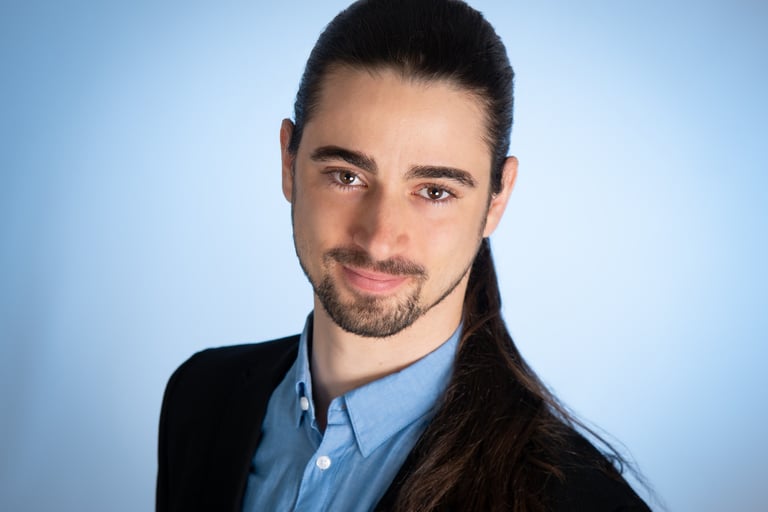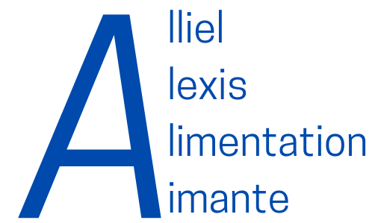Alexis Alliel: Bilingual Dietitian in Paris - Where Science Meets Compassion
A unique journey to nutritional expertise
I am Alexis Alliel, a qualified bilingual dietitian nutritionist fluent in both English and French, and my path to nutrition therapy represents a passionate career transformation that has given profound meaning to my professional life. Based in Paris (6th and 20th arrondissements) and Le Raincy, I provide specialized nutritional care to the international community and French nationals seeking a more compassionate approach to eating disorder treatment.
My practice transcends traditional dietetics. It's not about meal plans or calorie counting - it's about understanding the complex relationship between food, emotion, culture, and identity. As a specialist in eating disorders (anorexia, bulimia, binge eating disorder, ARFID), I've developed a unique therapeutic approach that combines scientific rigor with deep cultural sensitivity, particularly valuable for expatriates navigating food challenges in a foreign country.
Being bilingual isn't just about language fluency - it's about understanding the cultural nuances that shape our relationship with food. Whether you're an international student struggling with French food culture, an expatriate family dealing with a child's eating disorder, or a French national more comfortable expressing emotions in English, my practice offers a safe space where linguistic and cultural barriers dissolve.
My journey: From corporate confusion to therapeutic clarity
The winding road to purpose
My path to becoming a dietitian reflects the non-linear journeys many of my international clients experience. After completing my Baccalauréat in Economics and Social Sciences in 2009, I initially pursued studies in economics, management, and law at the University of Amiens. My curiosity about the world led me to explore languages, literature, and foreign cultures, seeking meaning through diverse academic pursuits.
This search took me to Germany, where I worked as a commercial assistant, immersing myself in different food cultures and lifestyle approaches. This international experience proved invaluable - I discovered firsthand how profoundly culture shapes our eating behaviors and how challenging it can be to maintain food identity while adapting to new environments. These insights now inform my work with expatriates facing similar challenges.
Returning to France, I navigated various industries, accumulating experiences that taught me the importance of active listening, cultural adaptation, and genuine human connection. A position as an insurance management assistant in Chantilly exposed me to the administrative realities of healthcare, reinforcing my conviction that something essential was missing from our care system - the human element.
The awakening: When everything clicks into place
Lost but determined to find my path, I experienced what many of my patients know intimately: that period when you know something must change but can't quite articulate what. This existential crisis, common among expatriates and career changers, led to my courageous decision in 2014 to start over completely.
My return to studies at EDNH (École de Diététique et Nutrition Humaine) wasn't merely a career change - it was a personal revelation. During these intensive years of training, I discovered that dietetics was the convergence point of all my passions: human behavior, food culture, cooking, medicine, physiology, sports science, psychology, sociology, and philosophy. Everything suddenly made sense.
Expertise forged through experience
My defining moment came during my Bachelor's internship at SOS Anor in April 2017. This immersion in the complex world of eating disorders opened my eyes to the profound suffering hidden behind appearances. I understood that treating eating disorders requires far more than balancing nutrients - it demands accompanying the whole human being through their journey of recovery.
Obtaining my BTS in Dietetics and Bachelor's in Human Nutrition in 2017 marked the official beginning of my practice, but my learning continues daily. Becoming a member of the SOS Anor association in September 2017, I joined their multidisciplinary team, learning the crucial importance of collaborative care with psychiatrists, psychologists, and other healthcare professionals.
My therapeutic philosophy: Integrating cultures and care
The bilingual advantage in nutritional therapy
My bilingual practice offers unique advantages that extend far beyond simple translation:
Cultural code-switching: I understand how food meanings shift between cultures. What represents comfort in one culture might signify indulgence in another. This cultural fluency allows me to help clients navigate conflicting food messages from different cultural backgrounds.
Emotional expression: Many clients find it easier to discuss painful emotions in one language over another. Some learned about food in their native language and struggle to articulate these deep-seated beliefs in a second language. My bilingual approach removes these barriers.
Family dynamics: In mixed-language families, eating disorders often exploit communication gaps. I facilitate family sessions where each member can express themselves in their preferred language, ensuring everyone feels heard and understood.
Core therapeutic values
Non-judgmental empathy: In my practice, there are no "good" or "bad" eating behaviors - only human beings doing their best with the resources available to them. My role is to understand, not to judge, regardless of cultural background or food practices.
Scientific rigor with cultural sensitivity: I base my practice on the latest nutritional research while recognizing that scientific recommendations must be adapted to individual cultural contexts. What works in one culture may be inappropriate or impossible in another.
Collaborative partnership: You are the expert on your life, culture, and experiences. I am the expert in nutrition and eating disorder treatment. Together, we co-create solutions that honor both your cultural identity and health needs.
Sustainable transformation: Radical changes rarely last, especially when they conflict with cultural values. I facilitate gradual transformations that respect your pace and integrate smoothly with your lifestyle and cultural practices.
My areas of expertise: Specialized care for diverse populations
Eating disorders: A multicultural perspective
My specialization in eating disorders encompasses the full spectrum, with particular expertise in how these conditions manifest across different cultures:
Anorexia nervosa: Beyond refeeding, I address identity reconstruction, management of food fears, and body reconciliation while considering cultural beauty standards and family expectations that may complicate recovery.
Bulimia and binge eating disorder: I work on restriction-binge cycles, emotional regulation, and all-or-nothing thinking patterns, understanding how cultural shame and secrecy may intensify these behaviors.
ARFID (Avoidant/Restrictive Food Intake Disorder): This often-misunderstood condition requires infinite patience and creativity. I help gradually expand food repertoires while respecting sensory anxieties and cultural food preferences.
Orthorexia and "clean eating": Particularly prevalent in health-conscious expatriate communities, I address the anxiety behind rigid food rules while respecting genuine health concerns and ethical food choices.
International family challenges
Expatriate children and teenagers: Navigating peer pressure, school lunch anxieties, and identity conflicts through food. I help young people maintain cultural food identity while adapting to French food culture.
Mixed cultural couples: When partners from different food cultures clash over family meals, children's nutrition, or eating disorder treatment approaches. I facilitate understanding and compromise.
International students: Managing homesickness through food, dealing with limited cooking facilities, budget constraints, and the pressure to maintain academic performance while struggling with eating issues.
Business expatriates: Addressing stress eating, irregular schedules due to global meetings, business dinner anxieties, and maintaining health goals despite frequent travel.
Metabolic and chronic conditions
Diabetes management: Adapting blood sugar management to various cultural diets, explaining French medical protocols to international patients, coordinating with international medical teams.
PCOS and hormonal disorders: Providing culturally appropriate dietary modifications while respecting religious or cultural food restrictions that may complicate standard treatment protocols.
Sports nutrition: Supporting international athletes training in France, addressing performance nutrition while preventing or treating relative energy deficiency in sport (RED-S) and exercise addiction.
My practice locations: Accessible care across Paris
Paris 6th - Saint Germain: The therapeutic heart
Located in the heart of the 6th arrondissement, my main office is situated within a collaborative health center where various healthcare professionals work together with a shared vision of holistic care. The atmosphere is warm and calming, creating ideal conditions for deep therapeutic work. The central location makes it easily accessible from anywhere in Paris.
Paris 20th - Saint Blaise: Modern and multicultural
In this vibrant, diverse neighborhood, my second office offers a modern, welcoming environment. The multicultural atmosphere of the area itself reflects my practice's international focus. Easily accessible by metro, it serves eastern Paris residents without requiring excessive travel.
Le Raincy: The wellness sanctuary
Located immediately next to the RER E station, this unique office is nestled within a yoga studio, creating an atmosphere particularly conducive to mind-body reconnection. The peaceful environment of this suburban location offers a retreat from Paris's intensity, ideal for those seeking a calmer therapeutic setting.
My ongoing commitment: Ethics, education, and evolution
Leading ethical practice
In 2024, I founded a peer supervision group for dietitians focused on ethics in nutritional care. This initiative addresses a crucial need: questioning our practices, sharing doubts, and enriching our approaches. Being a healthcare provider means constantly challenging our assumptions and growing through collective wisdom.
This group is conducted bilingually, allowing French and international practitioners to share perspectives and learn from diverse therapeutic approaches. The cross-cultural exchange enriches our understanding of how eating disorders manifest and can be treated across different cultural contexts.
Continuous professional development
I regularly participate in international conferences, training programs, and seminars to stay current with the latest nutritional science and eating disorder treatment approaches. My bilingual skills allow me to access research and training from both French and English-speaking experts, bringing the best of both worlds to my practice.
Community contribution
As an active member of several professional associations, I contribute to training future dietitians and raising public awareness about eating disorders and nutritional health. I provide mentorship to international dietetics students completing their training in France and offer guidance to expatriate healthcare professionals navigating the French healthcare system.
Working with international clients: Understanding unique challenges
The expatriate food experience
Living abroad fundamentally disrupts our relationship with food. Familiar products disappear, meal timing changes, social eating customs differ, and even the meaning of "healthy eating" shifts. I help clients navigate these challenges while maintaining their cultural food identity and developing a positive relationship with their new food environment.
Language and therapeutic alliance
The therapeutic relationship deepens when clients can express themselves fully in their preferred language. Complex emotions, childhood memories, and cultural nuances often get lost in translation. My bilingual practice ensures nothing important is lost and everything meaningful is understood.
Insurance and practical matters
I'm experienced in working with international insurance providers and can provide documentation in English for reimbursement claims. I understand the complexity of navigating healthcare as an expatriate and strive to make the administrative aspect as smooth as possible.
My vocation as a bilingual dietitian nutritionist isn't just a profession - it's a daily commitment to every person who trusts me with their story. In my practice, you'll find more than a nutrition expert: you'll find a culturally aware partner in your journey toward wellbeing. Because ultimately, living and eating are two sides of the same coin, and my role is to help you reconcile them in a way that honors both your cultural heritage and your health goals.
Living and eating are two sides of the same coin. Lighten your relationship with food and free yourself from what holds you back!


Vivre et manger sont les deux faces de la même pièce
Lighten your relationship with food and free yourself from what hinders you!
+33 6 22 41 55 21
© 2024. All rights reserved.
RPPS : 10007258733
N° ADELI : 75 95 0878 1
